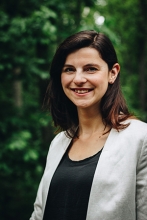MSE Seminar: Understanding Materials Performance of Nuclear Fuel & Waste Form Candidates

Department of Materials Science and Engineering
UC Irvine
Abstract: Nuclear chemistry is ubiquitous in our society. The future of energy production, nuclear medicine and space exploration will require a strong research effort going forward. A fundamental understanding of nuclear materials, their fabrication and chemistry as well as properties will be pivotal from a nuclear engineering standpoint. An in-depth understanding of these materials will be particularly important in extreme conditions such as in novel reactor designs for nuclear fission/fusion.
The overarching topic of my experimental research is materials chemistry in the nuclear fuel cycle. The fabrication of a suitable precursor material for potential nuclear waste forms as well as high-performance nuclear fuel candidates is the key to our research. We utilize and enhance wet chemical approaches, such as the internal gelation process to develop such precursors. We gain insight into structure property relationships for nuclear waste forms as well as high-performance nuclear fuel candidates by complementary characterization via, e.g. electron microscopy, X-ray absorption spectroscopy and neutron total scattering analysis. In order to understand the long-term behavior of a nuclear waste form in a deep geological repository in case of canister failure, dissolution studies were carried out. A complementary microscopic and macroscopic approach enabled us to understand how dissolution proceeds within pyrochlore type ceramics, which are considered as nuclear waste forms for plutonium, for example. As part of the Advanced Fuels Campaign from DOE, potential high-performance nuclear fuels were synthesized and characterized. The two main avenues pursued are one, the increase of the thermal conductivity of UO2 fuel by the addition of a second phase, and two, the addition of dopants to promote grain growth of UO2. Both avenues aim to enhance the safety as well as efficiency of UO2 based nuclear fuel. Research examples covering all of the above mentioned areas will be presented in the context of understanding materials performance in the nuclear fuel cycle.
Bio: Sarah Finkeldei is an assistant professor in chemistry in the UCI School of Physical Sciences. She completed her diploma in chemistry from the RWTH Aachen University, Germany, in 2014. Her research interests include nuclear materials chemistry, in particular oxide ceramics; structural uptake of radionuclides; nuclear waste form stability and corrosion behavior.
Share
Upcoming Events
-
EECS Seminar: Less Compute, More Intelligence – Efficient and Autonomous Generative AI and Agents
-
MAE 298: Microscopic Robots that Sense, Act and Compute
-
CBE 298 Seminar: Interface Modification for Electrocatalysis
-
CEE Ph.D. Defense Announcement: Machine Learning and Remote Sensing for Environmental Modeling - From Large-Scale Streamflow Forecasting to Malaria Risk Mapping
-
CBE Special Seminar: Operando Electrochemical Methods at Dynamic Energy Materials Interfaces
